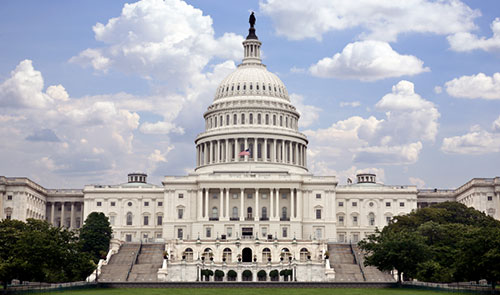Legislative Letters 8-9-20

With the new Title IX regulations going into effect this week, multiple suits have been filed in the last month to prevent or delay them from taking effect. Also, almost half of the attorney generals have sued Secretary DeVos for rolling back protection of students impacted by predatory for-profit institutions. And higher education institutions are still determining the impacts of ICE’s new student visas rules regarding online education. Congress is also fighting over how and when to start the collection of student loan payments again, and a student loan company was found to be misrepresenting their options. Finally, Yale University and others are being sued by their students for partial refunds from the spring semester.
Download PDFTHE EXECUTIVE BRANCH
DEPARTMENT OF EDUCATION
Title IX
Many advocates for education and women’s rights are suing the Department of Education due to the changes to Title IX. Multiple suits have been filed to prevent negative effects of the new sexual misconduct investigations. On the other side, 14 Republican attorney generals have filed a brief in defense of the new rules, in response to the 18 Democratic attorney generals that filed in June. They also ask the motion to delay the August 14 deadline for implementing the new rules be dismissed.
Student Borrower Relief from For-Profit Universities
In addition, 23 Democratic attorney generals are suing Secretary DeVos due to the rollback of student loan relief involving predatory for-profit institutions regulations put in place by the Obama administration. Opponents of the rollback believe it makes it very difficult to have their loans forgiven, since the victims must meet a higher burden of proof. While Congress passed bipartisan legislation to prevent the regulations, President Trump vetoed the bill.
IMMIGRATION AND INTERNATIONAL STUDENT CONCERNS
After the outrage from educators, students, and advocates in early July, the Immigration and Custom Enforcement (ICE) regulations around student visas for online classes was rescinded. However, this was not was not the end of the discussion. Harvard University and University of Southern California warned students they should stay in their home countries if they were planning on attending fully online courses, because the US would not allow them to enter the United States. ICE clarified that they would not be revoking student visas for those already here but would not grant new visas for fully online international students if they enrolled after March 9th.
THE LEGISLATIVE BRANCH
LEGISLATION
On July 29th, 47 higher education associations asked congressional leaders to extend the student loan borrowers from having to make payments until after Tax Day in April of 2021. As part of the CARES Act, student borrowers would begin paying again on October 1st, 2020. Under the Republican proposal, people would still begin payments October 1st, but would not have to pay more than 10% of discretionary income after food and housing. Democrats and the higher education associations believe this is not enough since many are still trying to recover from the economic impacts of the coronavirus. Democrats’ plans include an extension of the student loan benefits and possibly canceling up to $10,000 per borrower. The student borrower relief covers about 40 million people. The unemployment rate of people holding bachelor’s degrees has dropped from the high of 8% in April to 7%, according to the Department of Labor, it is still greater than the 2% in March.
The Judicial Branch
Litigation
Navient Ruled Against
A federal court has ruled that Navient, a student loan corporation, misrepresented themselves and deceptive practices regarding federal student loan payments and forgiveness. Josh Shapiro, the attorney general of Pennsylvania, brought the lawsuit, used the state consumer protection laws to show that Navient misled their student borrower customers, since the Higher Education Act does not give student borrowers the right to sue their loaners.
Yale Student Seeks Refund
A Yale student has also brought litigation against their university from when the university went online in the spring. Jonathan Michel claims the online schooling was inferior to being on campus because the campus facilities, materials, etc. were unavailable. Therefore, he believes Yale broke their contract by not refunding students’ tuitions. Yale University disagrees, claiming it was protecting students and citing they provided students with prorate refunds for room and board. Yale University is not the only higher education institution being sued because of their coronavirus response, with at least 10 other universities facing similar lawsuits.
IN RELATED NEWS…
Relevant Reads
Diversity, Inclusion, and Social Justice
Higher Ed Institutions Rethink Relationships With Police Amid Nationwide Protests
HBCUSs Grapple With Disparities
Are Colleges Meeting Their Social Responsibility?
The State of Higher Education
A Radical Proposal for How Elite Higher Education Can Change America
Is College Worth It? Not Unless Higher Education Disrupts Itself.
Four colleges on the fall semester
The United States Is Reopening Many of the Wrong Schools
Career Advice
How to Have ‘The Talk’ About Leaving Academe
Higher Education Policy
Higher Education Aims to Reduce Costs Amid Pandemic
8 Innovative Ideas For Higher Education Right Now
Will Higher Education Follow the ‘More from Less’ Story?
Disruptive Transformation- A Way To Change Higher Education
What’s the Likely Impact of COVID-19 on Higher Ed?
Want to let us know how we can improve? Give us feedback!
Comments are closed.